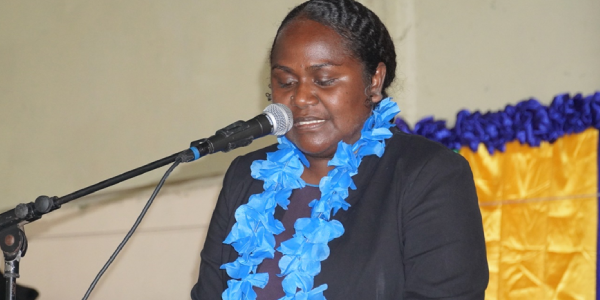Caretaker MEHRD Minister Tanangada announces tbe development of a ‘peace curriculum’ which amongst a number of factors, embraces ‘sexuality’ for a peaceful and harmonious SI
THE Ministry of Education & Human Resource Development (MEHRD) is working with the Ministry of Peace, Traditional Governance & Ecclesiastical Affairs (MPTGEA) and relevant stakeholders to develop a peace curriculum that amongst a number of factors recognizes and respects students’ sexual orientation.
Sexuality, in this case human sexuality, is the way people experience and express themselves sexually and covers lesbianism, gayism, bisexuality and transgender.
This peace curriculum is catered for in the Education Act 2023.
Speaking at the International Education Day celebration in Honiara last Friday, Caretaker MEHRD Minister Lanelle Tanangada said as a country, Solomon Islands continues to build peace initiatives with MPTGEA to integrate a peace curriculum into the school syllabus.
“The Ministry of Education and Human Resource Development together with the Ministry of Peace and Traditional Governance and Ecclesiastical Affairs are currently working together with relevant stakeholders, faith based organisations, education providers and schools on peace education in the country as captured in their 4-year plan 2020-2023.”
She said it is paramount that peace education is mainstreamed nationwide and the strategies employed to achieve this is collaboration with education institutions to develop a peace curriculum in partnership with other relevant stakeholders and institutions to develop comprehensive peace education material.
Ms Tanagada added that MEHRD is committed to the new education reform – Education Act 2023 which highlights the important role that education plays in protecting any child from any physical or psychological harm within or outside of Solomon Islands.
“Therefore, MEHRD will ensure that all students are provided with a safe and inclusive learning environment where their rights and responsibilities are recognized and respected. We ensure students are treated fairly regardless of their gender, sexuality, health, disability, religion, race or ethnicity. In addition, we must ensure that school learning environment is inclusive in terms of meeting special needs children through infrastructure and learning program/ materials.
“Furthermore, the MEHRD will ensure to provide students with the educational, social and emotional support required to fully engage in learning. Therefore, meeting individual needs through counseling services, teachers’ individualized planning, and specialized programs for special needs are crucial to address such special needs children,” she explained.
Caretaker Minister Tanangada said Part 2 (C) of the Education Act 2023 states that early childhood, primary, secondary education should promote culture, customs, values and attitudes that foster societal harmony and positive outcome and Part 2 (1) alludes that education create a tolerant, responsible, caring and politically aware citizens who understand their rights and responsibilities.
She said this is further stipulated in Part 3, Division 3 (1) and 4 (1) of school administrative instructions, which highlight the crucial role education plays in protecting a child from any form of harm – be it physical or psychological and occurs within or outside of Solomon Islands.
“Consequently, MEHRD will ensure that all students are provided with a safe and inclusive learning environment where their rights and responsibilities are recognized and respected.
“We are committed to treating students fairly, regardless of their gender, sexuality, health, disability, religion, race or ethnicity.
“Moreover, it is imperative to ensure that the school learning environment is inclusive in terms of catering to the needs of special needs children through appropriate infrastructure and learning programs/materials.
“Additionally, MEHRD will ensure the provision of educational, social, and emotional support required for students to fully engage in learning. Meeting individual needs through counseling services, teachers’ individualized planning, and specialized programs for special needs children are crucial to addressing their unique requirements.”
The caretaker MEHRD Minister said with this year’s International Education Day theme ‘Learning for Lasting Peace,’ the role of education in nation-building and development must be recognized.
On that note, she posed several rhetorical questions on the subject and these were how can education stakeholders use education as a tool to promote peace and development? What tools can be considered to better spot, tackle and prevent hate speech and violence amongst children and youths?
Caretaker Minister Tanangada then highlighted the need for a collective effort from parents and guardians, the government, teachers and leaders, families and communities and education providers to engage children and youth in every learning opportunity so that they are fully engaged, become meaningful citizens and promote peaceful co-existence and harmony wherever they live and serve.
By IAN LADDS
Solomon Star, Honiara









